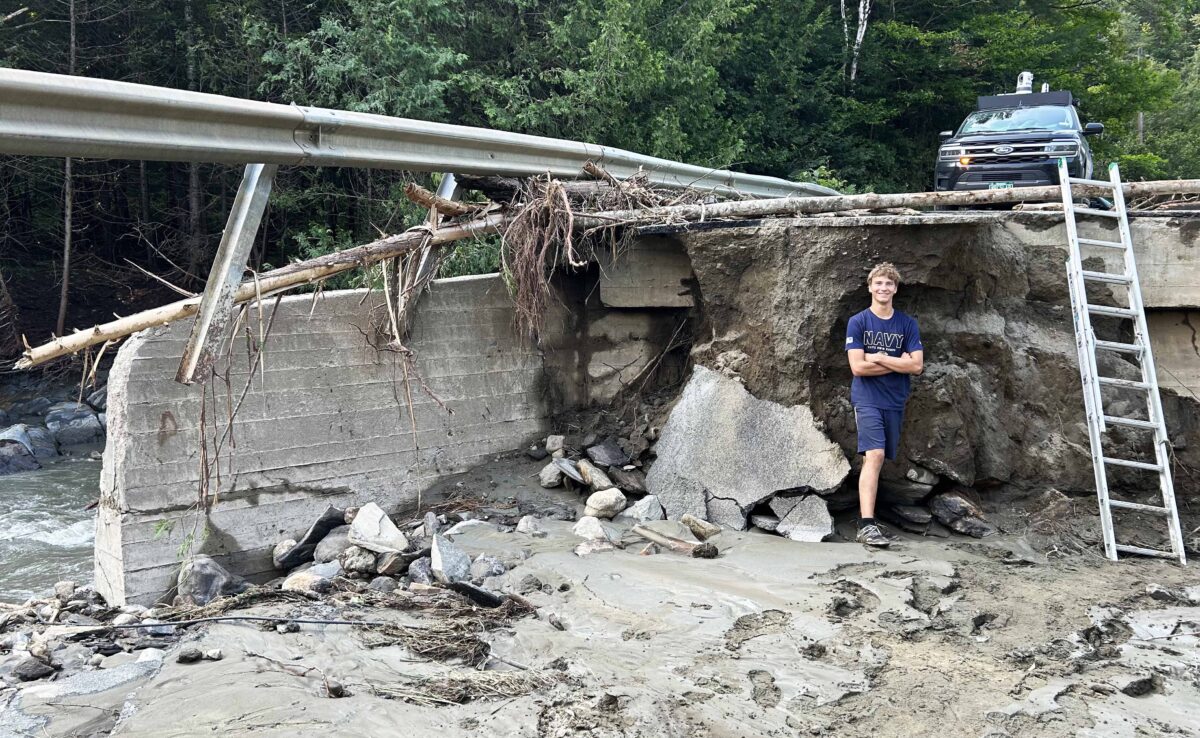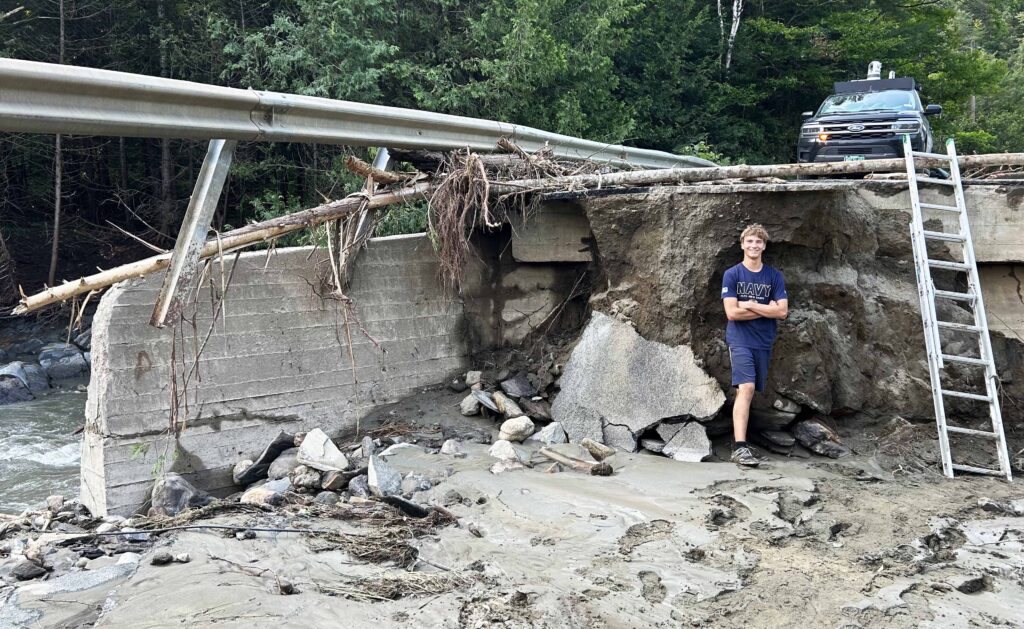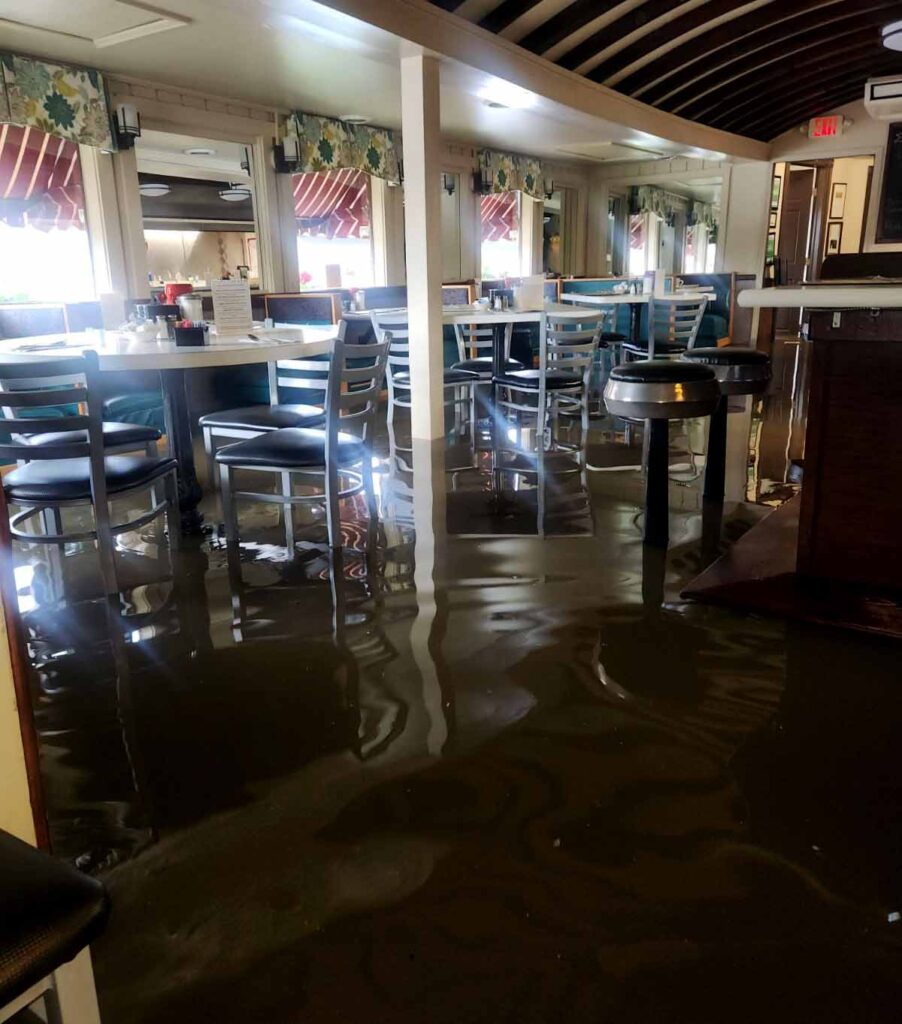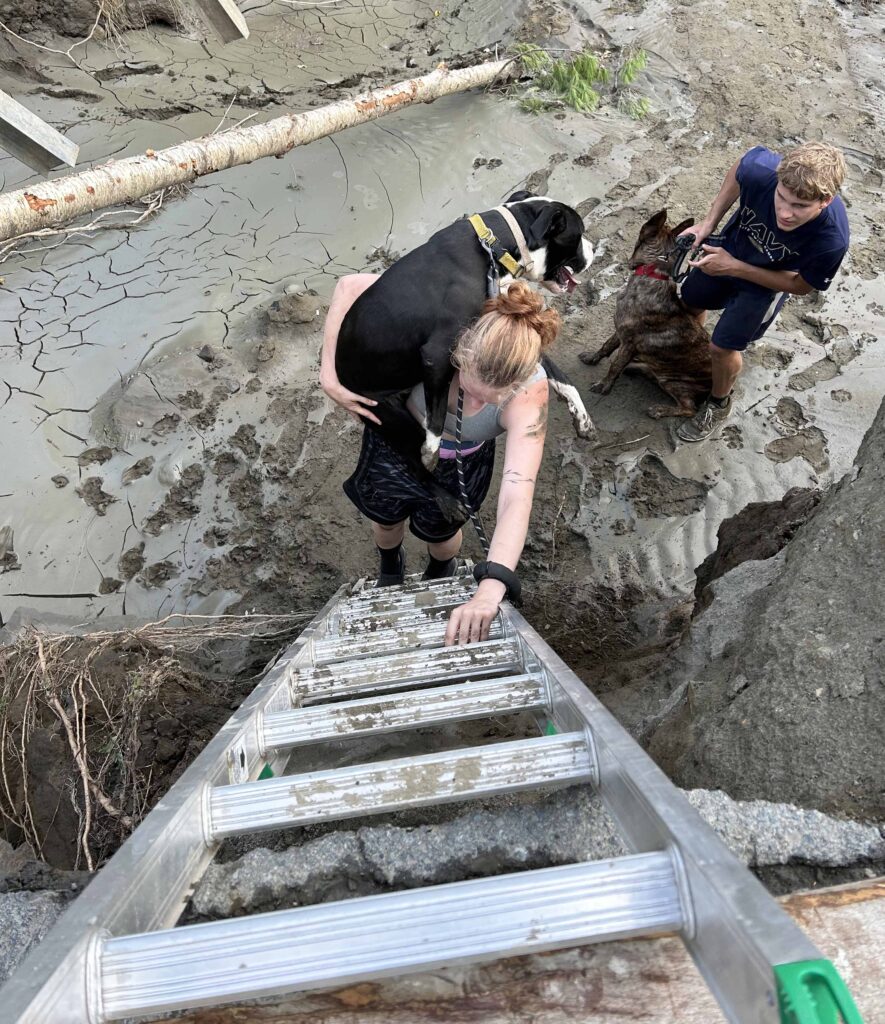
Caleb Nelson | Sports Editor | cnelson3@mail.smcvt.edu

Patrick Tester stands in front of the washed out section of Sugar Maple Rd., in Lyndon Vt., following the floods on July 30, 2024.
“They were taking layer upon layer of the floors out to rip everything up and I saw the floor covering from 1978,” said Janet Gray Burnor. “In that moment I said I think I’m done, I think I’m supposed to retire.”
Burnor has owned the Miss Lyndonville Diner in Lyndon, Vt., for 46 years, but she’s finally selling up because of the severe floods of July 10-11.
Known for its mild summers and snowy winters, Vermont has been severely affected by flooding the past two summers, causing damage to roads, businesses, and homes.
Three major floods took place in Vermont in just 12 months. In early July 2023, it rained a significant amount every day.
By July 10, the ground was so sodden the rain could no longer percolate into the soil, resulting in instant runoff, said Pete Banacos, the science & operations officer for the National Weather Service in Burlington, Vt.
By the morning of July 11, the state capital Montpelier was underwater.
A year later to the day, on July 10-11, 2024, Lydonville experienced significant flooding due to the remnants of Hurricane Beryl.
This was considered a primer event which once again meant the soils were already saturated before more rain fell.
This had a significant impact when the floods struck on July 30, 2024.
“As the rain falls on the already saturated ground it’s going into the runoff,” said Bonacos.
The Miss Lyndonville Diner was one of the few old-fashioned businesses still up and running in the Northeast Kingdom.
Burnor, who is originally from Toledo, Ohio, got into the restaurant business by lying about her age.
“Back then they didn’t check, so I didn’t turn 18 until September and I wanted to work right out of high school, so I got hired at a company called Frisch’s,” said Burnor.
In 1977, the Miss Lyndonville Diner became a part of her and her husband’s lives. Burnor and her husband had chosen Lyndonville, Vt., to raise their kids and decided to pounce on the opportunity to start a business when the Rustic Restaurant came up for sale.
They bought it and renamed it the Miss Lyndonville Diner.
Burnor was 27 and immediately noticed the role gender played in owning a business.
“It was a male-dominated society in the sense that I felt like none of the salespeople took me seriously,” said Burnor.
“They all wanted to deal with my husband, but I got the dining room and he got the kitchen and it was the first time people were responding to me for who I am.”
In the early days of the diner’s existence, it was mainly a truck stop attracting mostly male customers. At the start, Burnor and another employee worked up front while her husband managed the smooth running of the kitchen.

Dining area of the Miss Lyndonville Diner after the flooding in Lyndon, Vt., July 10, 2024.
She learned the importance of interacting with her customers who walked through the door.
One day a trucker came into the diner and asked Burnor, “ ‘What’s the matter with you? You don’t wave to people?’In Ohio waving at truckers is not common at all.
“I thought, oh my gosh, I need to wave at people when they wave at me. Stupid little things like that were insightful to me on how to better interact, connect, and communicate with the public,” said Burnor.
When the floods hit on July 10-11, 2024, Burnor was not too worried there was going to be much damage at all.
“The floods never really meant much before because we had been there since 1978 and I think we had three maybe four floods before this past summer,” said Burnor.
But they’d never experienced a storm like this. The Miss Lyndonville Diner had always experienced flooding in the lower dry stock room but it was never a big deal.
This was the first time the water had reached the dining room where people ate their food.
In the aftermath of the flood Burnor originally thought there was a chance to reopen but once remodeling began, reality started to sink in.
“We had to do what you call ‘flood cuts’, and those cuts happened on all the walls that were touched by flood water which meant every wall in the kitchen and in the dining room,” said Burnor.
After realizing the long and rigorous process ahead to reopen and start the business again, she decided to rebuild, put the diner up for sale, and retire. The whole process of rebuilding took a full two months.

Anna Robertson and Patrick Tester carry dogs out of a washed out road in the aftermath of the floods on July 30, 2024.
So far the total cost of all the repairs has been close to $200,000 said Burnor.
“There are local people that come in and just wanna know when are you gonna re-open, I mean that place is important to the community, and it is about the relationships, it’s about the people,” said Burnor.
Miss Lydonville Diner is only one of many family-run businesses that were severely affected by the floods this summer.
Many residents of the Northeast Kingdom have been similarly hard hit.
“The later July flood impacted me pretty profoundly because every road that led to our house was washed away,” said Loralee Tester, a longtime resident of the Northeast Kingdom and director of the Northeast Kingdom Chamber of Commerce.
“And you see businesses that have been there since I was a kid and even long before, that will just never come back.”
In the morning of the July 30 floods, Tester awoke and discovered her house was without power, there were two feet of water on top of her pool, and every road that led to her house was washed away.
After spending many years as an educator in the area, Tester got a call for assistance in the aftermath of the flood, one of them from the owner of the funeral home in Saint Johnsbury, whose three children she had taught.
Anna Robertson, the owner’s daughter, was completely stranded. “My son and I went and rescued Anna, her three friends, and her five dogs,” said Tester.
“We literally had to climb up a ladder because the dirt road had been washed away and there was only a ladder to use to pick the dogs up and bring them out down the other way.”
In September, President Joe Biden approved a major disaster declaration for Vermont for residents in the Caledonia, Essex, and Orleans counties.
This approval entitled residents in those counties to federal funding from the Federal Emergency Management Agency (FEMA).
“It was frustrating because everyone was extremely nice,” said Tester. “However, as clear and honest as I was about what our situation was, all they did was want me to fill out the paperwork.”
“Declaring a national disaster in September when this all happened in July seems a bit late to the game,” said Burnor.
Although Burnor could not speak on the programs her business was eligible for following the flood damage, as her accounts mostly covered the aftermath, she does believe FEMA tries its best to assist others.
“In the aggregate, we are seeing an increase in annual precipitation at most observant sites in Vermont… we are seeing more rainfall events that exceed the one-inch threshold so those are becoming more common as we see warmer weather patterns,” said Banacos.
Banacos encourages the general public to sign up for VT-ALERTS on the Vermont Government website.
Any hazardous weather, or water events as warnings, watches, and advisories will go directly to people’s phones.
“We are a mobile society and I think getting valuable weather information, especially warnings to people on the move is the next frontier we need to shore up,” said Bonacos.

